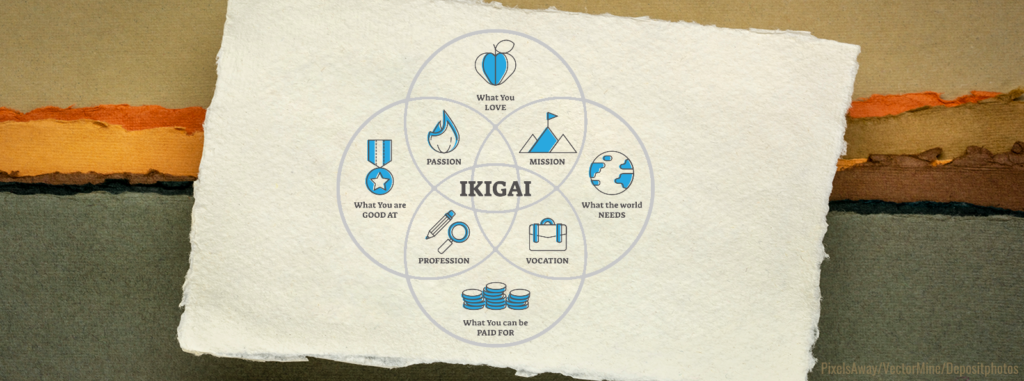The Japanese philosophy of life called Ikigai is becoming more and more popular in our Western world as well. Since I first wrote a practical guide on this subject two years ago, about half a dozen books and countless articles on ikigai have been published.
Hundreds of years of experience have gone into this philosophy, and many transformations and interpretations have been made especially over the past few decades, depending on who is looking at it from which angle. Ikigai itself cannot be reduced only to the purpose itself. It usually starts with the 4 core questions of Ikigai:
- What is it that you love?
- What are you really good at?
- What is it that the world needs?
- What is it that you can be paid for?
Of course, there is so much more behind this profound Japanese philosophy of life. For those who have never studied Ikigai, I recommend a quick look at this article about how to find your Why with Ikigai. The first part is about the history of Ikigai.

The concept of Ikigai can help you find your Why. Nevertheless, it does not mean that you can no longer have a good life without a purpose or that you have to find that one purpose. One of the biggest paradoxes seems to be that the very search for purpose often keeps people from finding their purpose. This leads us to the biggest misconceptions people have about their purpose, their ikigai:
- Misconception #1: Your Ikigai (aka your purpose) is valid for your entire life.
- Misconception #2: You must have an Ikigai, a purpose.
- Misconception #3: Until you find your purpose, you will not live a full life.
Misconception #1: Your Ikigai (aka your purpose) is valid for your whole life.
We humans, if all goes well, have quite a long life, which can be very different. I am a completely different person today with different interests than I was 30 years ago. Many things have changed: the environment I live in, my personal environment (ok, a few old friends are still around me, thankfully), the things I do to earn money and my skills have evolved as well. Not just evolved, I’ve regularly learned about completely new subjects, engaged with them, and opened up completely new worlds for myself. How can I expect my purpose of why I’m here could still be the same? Even what represents my ikigai as of today, why I can’t wait to get out of bed in the morning, may have completely changed 10 years from now. As our environment changes, so do the things and issues that are really important to us. We change and therefore your purpose, your meaning of life, may change too.
The model of Ikigai with the 4 main themes of love, ability, need and payment serves as a way to help you question your path. Most of the time we realize at a certain point that something is wrong, but we don’t know what it is. With the right questions and when we see the right connections, we can also figure out what is already here with us, what is good, and what may be missing.
Misconception #2: You must have an Ikigai, a purpose
Your ikigai, and therefore your meaning in life, is not a monogamous relationship that lasts for the rest of your life. As with relationships, there are people who find their meaning very early and can live this fulfillment in sheer happiness to the fullest until the end of their lives without even a day of doubt. Others do not find this fulfillment and go on a search for happiness and purpose all their lives. You don’t have to have that one purpose. The model of Ikigai says that all pillars (love, ability, need, payment) should be fulfilled and this is only logical. If everything that fulfills you does not bring in enough money, you cannot pay your bills. But it does not automatically say that everything has to be fulfilled out of a purpose. Most people will not only have a changing purpose in the course of their life, or at least make adjustments, but will also find their meaning in several areas. The art of life is, and this is where Ikigai helps you, to find these different themes and see if and how you can combine them.
Some people equate their purpose with meaning or confuse them with each other. You can have a purpose, a Why that drives you. And different tasks that help you to fill this Why with life and still earn enough to make a living. Or you have more than one Why. There is nothing wrong with that. Either they complement each other or you may try to find a balance here, how you can live well with them. The Ikigai model also supports you in this. Focus on what you already have, what is important to you and what supports your values.
Misconception #3: Until you find your purpose, you will not live a full life.
This is one of the assumptions with the most negative effects ever for our whole life. Articles, books or coaches telling you what you MUST have, that you can’t be happy without it. That you are missing something. Sure, if you feel that something is missing it makes sense to look closer and maybe start a change in your life. But that doesn’t mean that you can’t live a happy, joyful life until then. The route becomes the destination!

The best immediate help for this assumption is a first look at your life, at what you already have. We humans are, especially currently, so focused on what we want to have or what we think we are missing, that we pay far too little attention to what we already do have in life. Here I recommend you to invest a few minutes of your time in the article “The pursuit for happiness“.
Even if you haven’t found your purpose in life yet or are unable to do so right now due to current circumstances, you can still live a happy and fullfilling life. There is so much to be grateful for here and now. Start with what you have and develop towards your purpose. Your Why is something like a guiding star in the sky that leads the route, the direction. Something that you can orientate yourself by, like your values. And now enjoy your path and the time you spend on this route. That alone will make your life so much more fulfilling.





Comments are closed.